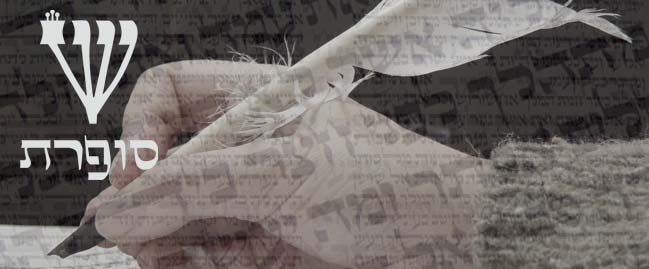MORE ON MEGILLAH
בס"ד
18 Tishrei, Chol Ha-Mo'ed Sukot
Qeset HaSofer 28 Se'if: Hey = note Vav in Lishkat HaSofer: the tradition continued "& the margin notes on (Ohr Zarurah) I looked into these & it says there b'sefer samekh ayin gimel the 10 sons of Haman there should be ISH at the beginning of a row & ET at the end of the row & I saw additionally to unify The Name (Le-Echad Qadosh) he speaks the genius the sage the teacher who wrote this (is apparently Chayim Yosef David Azulai) he says in his Peyrush Kisey Rachamim LM"S there in chapter 13 Halakhah 10 this is a direct quote from that text: "when one writes the Megilah it has to be with the sons of Haman at the end & the word 'aseret' has to be at the end of the daf." his words. & see in She'eylot Tshuvot Beit Efraim, siman Ayin, so they went a little longer on this matter in the end he brings what is in the tradition as it's written that ISH must be at the top, etc. [they're using daf & amud interchangeably here, so it's interesting]...the intention of this tradition is our minhag & is the same & IMHO it seems that following the fact that he doubled & said both things, b'sof ha-daf ve-be-sof ha-amud [at the end of the page & at the end of the column], we learn from this because he said ISH at the beginning of the daf at the beginning of the width of the daf he said that at the beginning of the row & not at the beginning of the column...therefore we see IMHO even though it's not in our hands to change the minhag [tradition], we have the minhag of this taking up the whole page. If in any case it happens that a Megilah does not have ISH at the top of the page & if there is another Megilah but that other one has in it some kind of unfavourable condition or some kind of doubt, then you read from the other. (this is really just to make sure we always remember that the 10 sons of Haman always take up a whole daf - the repetitions gets to you). In any case, ASERET comes at the end of the page, as it says in Makhseket Sofreim, but if you don't have it at the end of the amud, then you're not going to read from that Megilah unless there is not another kosher then you can & everyone is yotzey & you even say brakhahs.
(so we have to be strict strict strict, making a lot of difference between Megilot, but if you only have this one then you have to use it the exact same way as if it were kosher & even say brakhahs in other words make them exactly the same/treat them exactly the same. Why? Because you really want kosher Megillahs you want them not sloppy but the mitzvah is to hear it, so when push comes to shove, make it as perfect as you can & if you can't then be practical & make sure people re are still yotzei.
Sai'f vav in Q"HS - what soferim are accustomed to writing, the 10 sons of Haman large, it's not really from the ikar/essence of the law/tradition of the large letters. The soferim are accustomed to doing this according to the majority write the Megilot on large pages/columns & the 10 sons of Haman are only 11 rows & they need to fill with them the whole page & there would remain a big empty space at the end it a big empty space in between, so they write the letters big (obviously it's important for these men's names to occupy their own column). & even though on another page one doesn't make big letters or little letters because it's not accepted by the masters of the tradition to do that since Aseret B'nai Haman (the 10 sons of Haman) are written on a special daf by themselves, one doesn't need to be strict even though the other pages are written in small, fine, delicate writing & this is written in gross writing - don't worry about it. if the panels of the Megilah are not long & the appearance of the column, if one writes with a medium writing, close to the writing of the rest of the pages, then it's better to write with an intermediate sized script.














1 Comments:
Hello,
Just curious - the same Kesses haSofer who you quote extensively, and obviously hold in high regard, poskins, at the beginning of the sefer, that a women may not write a sefer Torah. (By the way, it's based on pesukim in the Torah - the same one you are writing! - not on any value judgement).
I am just wondering, honestly, what rationalization do you have for ignoring this halacha, while writing extensively about others? Have you decided which is more important? It gives the impression that halacha is something that you pick and choose as you deem necessary. Please clarify...
Post a Comment
<< Home